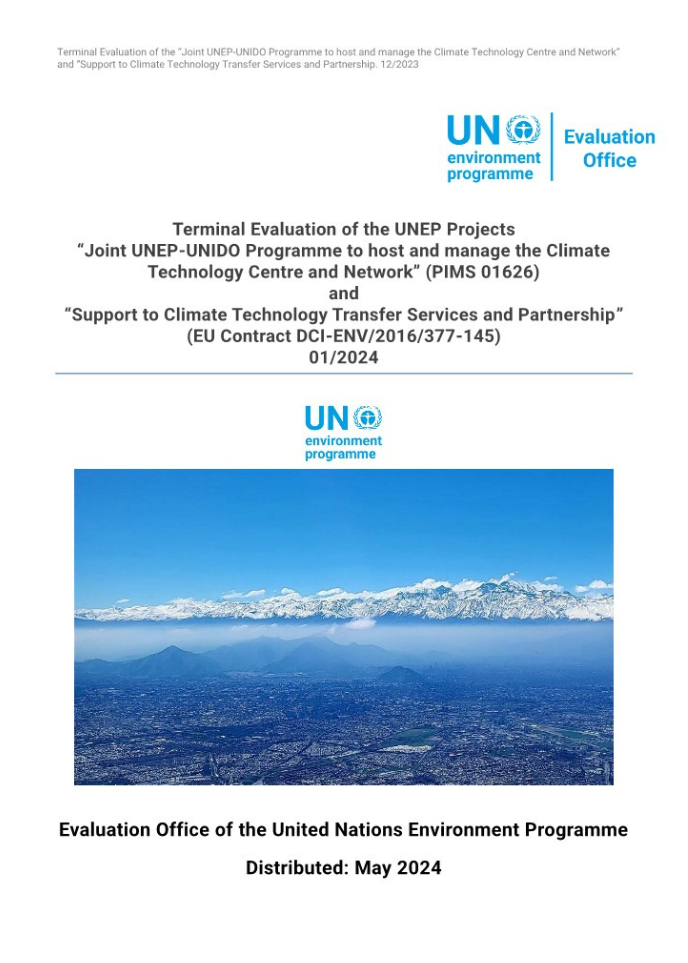
Terminal Evaluation of the UNEP Projects “Joint UNEP-UNIDO Programme to host and manage the Climate Technology Centre and Network”
Year of Publication: 2024
Authors: Maria Kontro, Kevin Enongene
Abstract
Climate change constitutes one of the most serious challenges faced by society. Tackling its challenges requires a holistic, concerted, and global efforts. Technology considerations are considered fundamental for achieving climate change adaptation and mitigation. Consequently, an accelerated transfer, diffusion and deployment of climate technologies in developing countries is primordial for attaining a transition towards a low-emissions and climate resilient development at a global scale.
Since its establishment, the United Nations Framework Convention on Climate Change (UNFCCC) recognized the central place of technology in achieving the objectives of the Convention. The 16th session of the Conference of Parties (COP), organized in 2010, established the Technology Mechanism, which was tasked with addressing a set of barriers impeding the deployment of technologies. The Technology Mechanism comprises of i) a policy arm: the Technology Executive Committee (TEC), with the focus on identifying policies to accelerate development and transfer of low-emission and climate resilient technologies, and ii) an operational arm: the Climate Technology Centre and Network (CTCN), to promote adaptation and mitigation technology transfer through small size catalytic projects.
CTCN comprises of the Climate Technology Centre and its Network of members. Through a competitive tendering process, the United Nations Environment Programme (UNEP)-led consortium was selected at the 18th session of the COP to host and manage the CTCN. To formalize the hosting of the CTCN, a memorandum of understanding (MoU) was signed on February 2013. Therefore, the Climate Technology Centre is managed and hosted by UNEP-led consortium, implemented through the UNEP Industry and Economy Division, which provides administrative and infrastructural support to the centre.
The European Commission (EC) has been the largest individual donor of the CTCN and a key partner. The European Union Delegation Agreement in regard to “Support to Climate Technology Transfer Services and Partnership” was signed on November 2016. Both the UNEP ProDoc and EC Grant ended in 2022.
CTCN recognizes that the opportunities and challenges relating to climate technology transfer are country, region, sector and technology specific, influenced by varying levels of economic development, industrial and technical capacity, experience in climate change adaptation and mitigation activities, among other factors.
As the world is behind the climate change targets the COP, in its 28th session, decided to end the era of fossil fuels, underpinned by deep emissions cuts and scaled-up finance. The role of climate technology transfer is essential in this decision, highlighting the role of the CTCN also towards the future through its catalytic action on technology transfer.
This evaluation
In line with UNEP’s 2022 Evaluation Policy and the requirements of the EC Grant, this terminal evaluation had the following purposes: Be a source of accountability, contribute to learning, generate evidence and support evidence-based decision making, operational improvement and knowledge sharing. The evaluation was commissioned to assess the performance of the Programme against nine evaluation criteria applied by UNEP: Strategic Relevance, Quality of Programme Design, Nature of External Context, Effectiveness, Financial Management, Efficiency, Monitoring and Reporting, Sustainability, Factors Affecting Programme Performance and Cross 12 Terminal Evaluation of the “Joint UNEP-UNIDO Programme to host and manage the Climate Technology Centre and Network” and “Support to Climate Technology Transfer Services and Partnership. 12/2023 Cutting Issues. It also provided an answer to the six Key Strategic Questions, as defined in the evaluation Terms of Reference (Annex X).
The evaluation concentrated on the activities of the United Nations Environment Programme project document “Joint UNEP-UNIDO Programme to host and manage the Climate Technology Centre and Network” (hereafter UNEP ProDoc) and the European Commission funding agreement “Support to Climate Change Technology Transfer Services and Partnerships” (hereafter EC Grant). The evaluation covered the period from 2013 up to end of 2022, however, specific emphasis was placed on the period 2016-2022 and the activities undertaken using the European Commission funding agreement.
The methodology used a dual track methodological approach of theory-based evaluation and outcome harvesting to enable evaluating the complexity of the CTCN operations. The data collection included desk review; sub-project portfolio review of the Technical Assistance (TA), networking, information and capacity building services; 44 key informant interviews (KII) at the strategic level and 124 KIIs at the country-level (total gender balance 61 % male and 39 % female; gender balance was achieved at global level KIIs) conducted both online and in person; field visits to 6 countries (Malawi, Zambia, Laos, Thailand, Chile and Antigua and Barbuda) with sampling of 22 sub-projects of the technical assistance; and visit to the CTCN Advisory Board meeting. The evaluation process was managed by the Evaluation Office of UNEP in close consultation with the CTCN Secretariat and with strategic direction from the Evaluation Reference Group.
